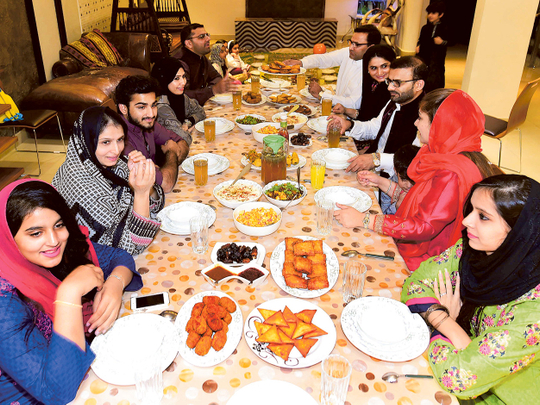
Ajman: Iftar for the Shaikhani family, who belong to the Pakistani Memon community, is more than about ending the day’s fast. Each sunset renews their Ramadan tradition of charity and kinship as well.
That is not to say it’s not about food also – it is.
“We Memons are very family and community-oriented. We are foodies as well. That’s why we love to share food, give in charity and socialise at iftar. It’s a big deal for us every day,” said Ahmad Shaikhani, president of Pakistan Business Council Dubai and assistant secretary-general of the Middle East division of the World Memon Organisation.
Ahmad and his wife and children, who live in Dubai, join the families of his three brothers – Rizwan, Mahmud and Muzamil – and their mother at the Shaikhani family home in Ajman at almost every iftar. Relatives and friends are also regular guests at the Shaikhani residence for iftar, with the villa teeming with 20-25 people any given day.
“Ramadan is also about catching up with family and friends and sharing good times together.”
While the women busy themselves with preparing iftar snacks, the children are also busy – but not in play. They are neatly arranging gift packs, purchased with their pocket money, for blue-collar workers. The packs, which include a prayer mat and toiletries, are gifted to workers every day, with the aim to reach 100 workers by the end of Ramadan.
The men too are supporting those in need, with iftar meals for 2,500 low-income workers distributed daily at mosques and labour accommodations in Muhaisnah and Dubai Investments Park.
“Memons have a strong tradition of charity and we cannot imagine Ramadan – the month of giving – without caring for the less privileged. That’s why even the kids started their own campaign for workers,” said Rizwan Shaikhani.
It’s nearly iftar time and the Shaikhani villa is bustling with last-minute preparations. The kitchen is filled with the aroma of traditional fried snacks while the children take over a room as their command centre for project charity, packing the gift bags with military discipline.
The Shaikhani brothers wade from room to room to help out while chatting and catching up on the day’s affairs.
The dining table is set and everyone takes a seat, whispering prayers. The hall is silent and everyone is keeping an ear for the Maghrib (sunset) adhan, the call to prayer that will signal the end of the day’s fast.
As soon the adhan floats into the hall, it ushers the sounds of glasses being filled with sherbets as the tableware comes to life.
On the menu are traditional Memon snacks prepared at home. There is the Nargisi kebab, fried mincemeat stuffed with egg, encased in a golden crispy batter. Another favourite is the Gulgulay, deep-fried balls of dough cooked in ghee, with gud (jaggery) added for sweetness. Gud is also the base for the sherbet of choice at the Shaikhani household. Another sweet snack is the sweet samosa, replacing the typical mincemeat filling with coconut.
The families break for prayer before returning for snacks. “This routine will continue till suhour. There is no one big dinner as such. Everyone eats at their own pace, over tea and chit-chat, and this goes on for the whole night,” Ahmad said.
With dawn, another day will begin in anticipation for another grand iftar.












